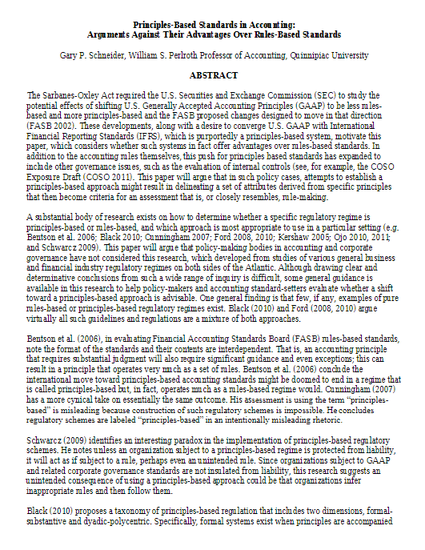
Presentation
Principles-Based Standards in Accounting: Arguments Against Their Advantages Over Rules-Based Standards
American Society of Business and Behavioral Sciences Annual Conference
(2013)
Abstract
The Sarbanes-Oxley Act required the U.S. Securities and Exchange Commission (SEC) to study the potential effects of shifting U.S. Generally Accepted Accounting Principles (GAAP) to be less rules-based and more principles-based and the FASB proposed changes designed to move in that direction (FASB 2002). These developments, along with a desire to converge U.S. GAAP with International Financial Reporting Standards (IFRS), which is purportedly a principles-based system, motivate this paper, which considers whether such systems in fact offer advantages over rules-based standards. In addition to the accounting rules themselves, this push for principles based standards has expanded to include other governance issues, such as the evaluation of internal controls (see, for example, the COSO Exposure Draft (COSO 2011). This paper will argue that in such policy cases, attempts to establish a principles-based approach might result in delineating a set of attributes derived from specific principles that then become criteria for an assessment that is, or closely resembles, rule-making.
Disciplines
- Business and
- Accounting
Publication Date
February, 2013
Location
Las Vegas
Citation Information
Gary Schneider. "Principles-Based Standards in Accounting: Arguments Against Their Advantages Over Rules-Based Standards" American Society of Business and Behavioral Sciences Annual Conference (2013) Available at: http://works.bepress.com/gary-schneider/35/
